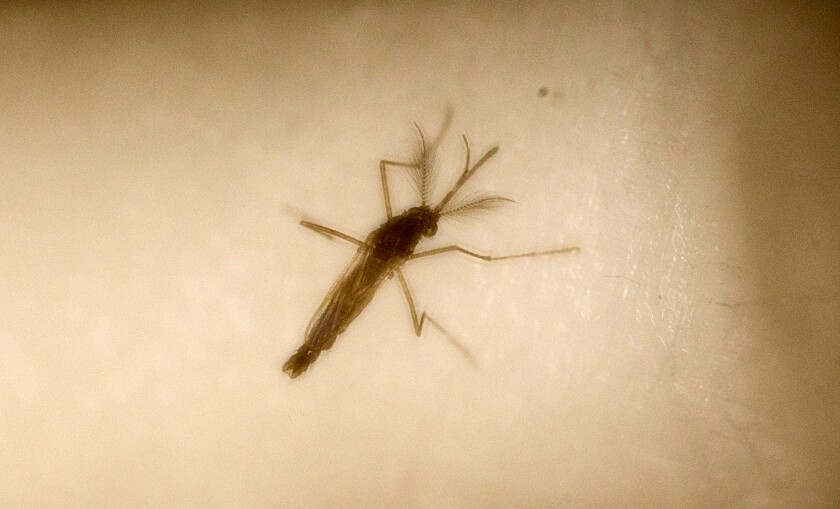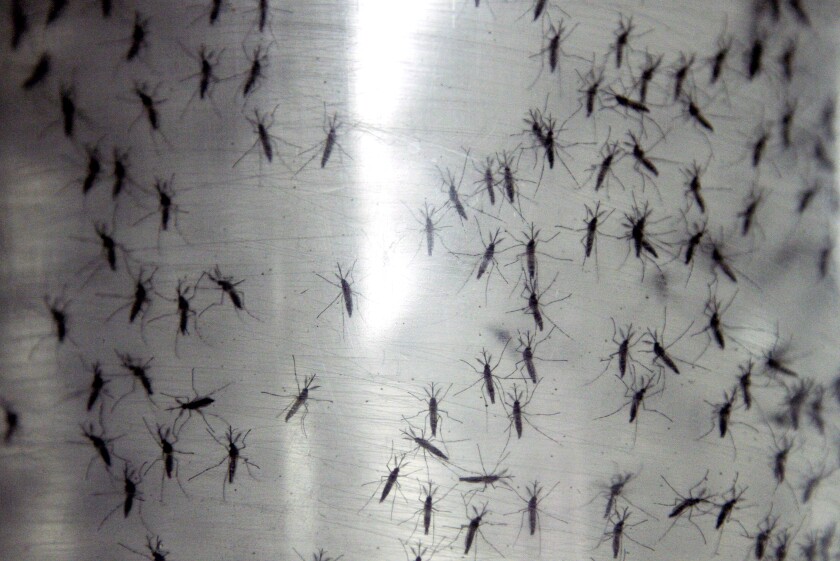
In the mosquito breeding rooms of British biotech company Oxitec, scientists line up fresh eggs, each the size of a grain of salt. Using microscopic needles, the white-coated researchers inject each egg with a dab of a proprietary synthetic DNA.
For four days, Oxitec technicians care for the eggs, watching for those that hatch into wriggling brown larvae. Those “injection survivors,” as the company calls them, face a battery of tests to ensure their genetic modification is successful.
Soon, millions of these engineered mosquitoes could be set loose in California in an experiment recently approved by the federal government.
Oxitec, a private company, says its genetically modified bugs could help save half the world’s population from the invasive Aedes aegypti mosquito, which can spread diseases such as yellow fever, chikungunya and dengue to humans. Female offspring produced by these modified insects will die, according to Oxitec’s plan, causing the population to collapse.
“Precise. Environmentally sustainable. Non-toxic,” the company says on its website of its product trademarked as the “Friendly” mosquito.
Scientists independent from the company and critical of the proposal say not so fast. They say unleashing the experimental creatures into nature has risks that haven’t yet been fully studied, including possible harm to other species or unexpectedly making the local mosquito population harder to control.
Even scientists who see the potential of genetic engineering are uneasy about releasing the transgenic insects into neighborhoods because of how hard such trials are to control.
“There needs to be more transparency about why these experiments are being done,” said Natalie Kofler, a bioethicist at Harvard Medical School who has followed the company’s work. “How are we weighing the risks and benefits?”
She pointed out that the possible benefits of the technology in California are lower than they would be in more tropical regions of the world where mosquito-borne disease outbreaks often threaten humans. California has never had a case in which an Aedes aegypti was found to transmit disease.

A captured Aedes aegypti mosquito is shown in 2016 at the Florida Mosquito Control District Office in Marathon, Fla.
(Wilfredo Lee / Associated Press)
Nathan Rose, Oxitec’s head of regulatory affairs, said the company chose California because the Aedes aegypti mosquitoes have spread rapidly after being discovered in the state about a decade ago. The tiny, aggressive day-biters can lay eggs in a space as small as a water-filled bottle cap left in the backyard.
Rose noted that the company found its mosquito reduced the population in a Brazilian neighborhood by 95% in just 13 weeks.
So far, Oxitec has released little of its data from that experiment or from a more recent release in the Florida Keys. It hasn’t yet published any of those results in a peer-reviewed scientific journal — publications that scientists expect when evaluating a new drug or technology.
On March 7, the U.S. Environmental Protection Agency announced that it had granted Oxitec a permit to release its transgenic insects on 29,400 acres in the counties of San Bernardino, Fresno, Stanislaus and Tulare.
The company plans to start the release in northern Tulare County in the Central Valley, where it has partnered with the local mosquito control district based in the city of Visalia.
The experiment must still be approved by the state Department of Pesticide Regulation.
Inserting synthetic DNA into mosquitoes
To create its mosquito, known as the OX5034, Oxitec started with Aedes aegypti captured in Mexico’s Chiapas state. Its scientists then inserted into the insects a synthetic DNA sequence they call the “self-limiting” gene.
When the engineered male mosquitoes are released into neighborhoods and mate with the wild bugs, the gene works to kill the female offspring, Oxitec said. The male progeny fly away to mate with more of the local mosquito population, further spreading the company’s gene, which it says is lethal only to the Aedes aegypti and not other species.
The company said that because it is releasing only males there is no danger of the public being bitten by an engineered insect. Only female mosquitoes bite and carry disease.
Oxitec scientists also inserted a fluorescent marker gene into the modified bugs. That gene produces a protein to make its mosquitoes glow when exposed to a specific color of light so that the company can track them.

Genetically modified aedes aegypti mosquitoes are held in a container before being released in Panama City in 2016.
(Arnulfo Franco / Associated Press)
The company plans to use the data from the California experiment to try to gain full commercial approval of its engineered mosquitoes from the EPA — a goal that would substantially increase the private company’s value. It uses the same technology in myriad other invasive pests, including the fall armyworm and the soybean looper, which it hopes to sell in the U.S. and around the world.
Oxitech is owned by Third Security, a private company in Virginia founded by billionaire Randal J. Kirk. The former lawyer became wealthy through founding and investing in pharmaceutical companies. He received more than $1 billion in 2007 when his company New River Pharmaceuticals and its attention deficit disorder drug called Vyvanse were purchased by Shire.
More recently, Kirk has focused on experimental products created through genetic engineering. Another of his investments is the genetically modified salmon created by the company AquaBounty to grow faster with less food. AquaBounty is now farm-raising the modified fish for commercial sale at facilities in Indiana and on Prince Edward Island.
Experiment in the Central Valley
When it comes to the environment, growing modified fish inside a factory raises different issues than releasing winged experimental creatures into the wild, which the company hopes to do soon in Tulare County if state regulators agree.
Oxitec has proposed releasing its mosquitoes at 48 different locations in the county. Under the plan, the company said it would release a maximum of 3.5 million mosquitoes a week.
“This is alarming,” said Angel Garcia, who lives near Visalia, where the first engineered bugs may be released. “Residents have not been consulted and they have not consented to being part of this.”
Garcia, who does outreach to local residents as part of his job for the nonprofit group Californians for Pesticide Reform, pointed to a hiring event that Oxitec hosted in Visalia on March 17. A company flyer said it was hiring field and lab technicians.
“It’s as if this is already a done deal,” he said.
Rose told The Times that the company was still waiting for state approval while also continuing with plans to build a research facility in Visalia to aid in the work...
No comments:
Post a Comment